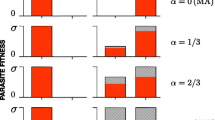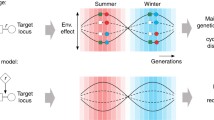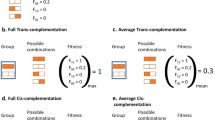Abstract
The recombination of genes is clearly disadvantageous in a uniform and predictable environment where a single multilocus genotype is optimal. But heterogeneity or unpredictability do not necessarily imply a short-term advantage for recombination, which will be created only if the correlation between adaptively important features of the environment frequently changes sign1. Another way of expressing this conclusion is to say that genes causing non-zero rates of recombination will tend to spread only if selection often favours a change in the sign of linkage (gametic phase) disequilibrium2. Because it is difficult to imagine that the physical environ-ment often behaves in this fashion, recent theoretical work on the maintenance of sex, recombination and outcrossing has speculated that biotic interactions may be important3–5. May and Anderson6 analysed a two-locus haploid model of the coevolution of host and parasite, similar to that considered here, and showed that the mean fitness of a population with recombination is typically higher than that of a population without, although they did not explicitly consider changes in the frequency of genes affecting recombination. Hutson and Law7 and Bell8 suggested that the crucial feature of antagonistic interactions between species is the effect on the current fitness of a genotype of its frequency in previous generations; such time-lagged frequency-dependent selection tends to destabilize both genotype frequencies and linkage disequilibrium, whose oscillation has been shown to fuel the spread of high-recombination alleles in explicit genetic models8. In this paper, we shall show how the mutual antagonism of two species can lead to a cyclical game in which high-recombination alleles can have a large short-term selective advantage in a fully defined genetic model.
Similar content being viewed by others
References
1. Maynard Smith, J. J. theor. Bio/. 30, 319–335 (1971). 2. Charlesworth, B. Genetics 83, 181–195 (1976). 3. Jaenike, J. Evol. Theory 3, 191–194 (1978). 4. Hamilton, W. D. Oikos 35, 282–290 (1980). 5. Tooby, J. J. theor. Biol. 97, 557–576 (1982). 6. May, R. M. & Anderson, R. M. Proc. R. Soc. B 219, 281–313 (1983). 7. Hutson, V. & Law, R. Proc. R. Soc. B 213, 345–359 (1981). 8. Bell, G. The Masterpiece of Nature (Croom Helm, London, 1982). 9. Flor, H. H. Adti. Genet. 8, 29–54 (1956). 10. Maynard Smith, J. Evolution and the Theory of Games (Cambridge University Press, 1982).
Author information
Authors and Affiliations
Rights and permissions
About this article
Cite this article
Bell, G., Smith, J. Short-term selection for recombination among mutually antagonistic species. Nature 328, 66–68 (1987). https://doi.org/10.1038/328066a0
Received:
Accepted:
Issue Date:
DOI: https://doi.org/10.1038/328066a0
- Springer Nature Limited
This article is cited by
-
Experimental evolution of recombination and crossover interference in Drosophila caused by directional selection for stress-related traits
BMC Biology (2015)
-
Infection elevates diversity
Nature (2015)
-
Mutation accumulation and fitness effects in hybridogenetic populations: a comparison to sexual and asexual systems
BMC Evolutionary Biology (2007)





